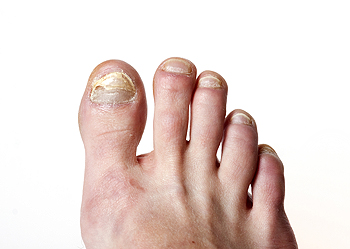1648 US Highway 130
North Brunswick, NJ 08902

Toenail fungus, medically known as onychomycosis, is a common nail infection that can be both unsightly and uncomfortable. It typically occurs when fungal organisms, like dermatophytes, infiltrate the nail bed through small cuts or separations in the nail or surrounding skin. The symptoms of toenail fungus are recognizable. Infected nails often become discolored, appearing yellow, brown, or white, and they may thicken and become brittle. As the fungus progresses, the nails can become crumbly and ragged. In some cases, they may emit a foul odor. Other potential signs of toenail fungus include pain or discomfort, especially while wearing shoes. The infection can also spread to other nails or the surrounding skin, leading to additional fungal growth and irritation. If you have noticed the beginning signs of toenail fungus, it is strongly suggested that you schedule an appointment with a podiatrist who can promptly begin the appropriate treatment.
If left untreated, toenail fungus may spread to other toenails, skin, or even fingernails. If you suspect you have toenail fungus it is important to seek treatment right away. For more information about treatment, contact Dr. Robert Fink of Brunswick Foot & Ankle Group. Our doctor can provide the care you need to keep you pain-free and on your feet.
Symptoms
Treatment
If self-care strategies and over-the-counter medications does not help your fungus, your podiatrist may give you a prescription drug instead. Even if you find relief from your toenail fungus symptoms, you may experience a repeat infection in the future.
Prevention
In order to prevent getting toenail fungus in the future, you should always make sure to wash your feet with soap and water. After washing, it is important to dry your feet thoroughly especially in between the toes. When trimming your toenails, be sure to trim straight across instead of in a rounded shape. It is crucial not to cover up discolored nails with nail polish because that will prevent your nail from being able to “breathe”.
In some cases, surgical procedure may be needed to remove the toenail fungus. Consult with your podiatrist about the best treatment options for your case of toenail fungus.
If you have any questions, please feel free to contact our office located in North Brunswick, NJ . We offer the newest diagnostic and treatment technologies for all your foot care needs.